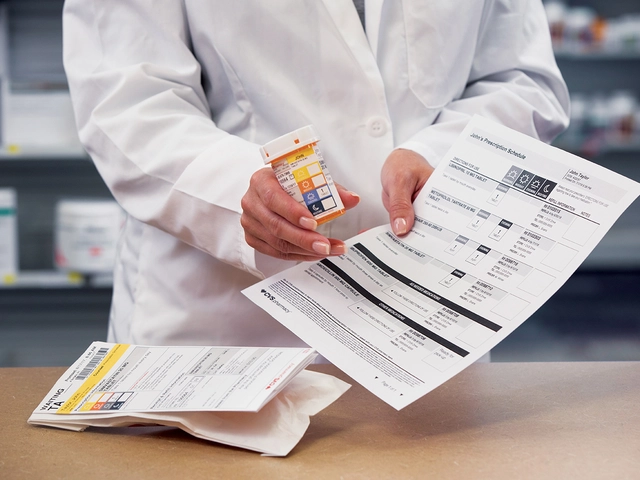Motilium Alternatives: Top 6 Options for You
Looking for alternatives to Motilium? You're not alone. Many people are exploring other ways to manage digestive discomfort. Each option comes with its own set of benefits and downsides, so let's break them down.
First up is good ol' Natural Ginger. It’s not just for cookies and gingerbread houses. People have used ginger for centuries to tackle nausea and improve digestion. It’s a go-to remedy for morning sickness and motion sickness too.
- Natural Ginger
- Peppermint Oil
- Cyclizine
- Metoclopramide
- 5-HT3 Receptor Antagonists
- Domperidone (Off-Label)
- Conclusion
Natural Ginger
Natural ginger is a popular alternative for digestion and nausea relief. It's been around in medicinal use for over 2000 years, and it’s got some solid science backing it up. Not just a spice, ginger is a natural powerhouse when it comes to reducing nausea, dizziness, and more.
Pros
- Natural remedy: Ginger is a natural solution with fewer side effects compared to synthetic medications.
- Reduces nausea: It effectively curbs nausea, making it a favorite for pregnant women dealing with morning sickness and travelers suffering from motion sickness.
- Anti-inflammatory: Ginger has anti-inflammatory properties that can help alleviate symptoms of digestive inflammation.
- Easily accessible: You can find ginger in numerous forms—fresh, dried, powdered, or as supplements almost anywhere.
Cons
- Not for everyone: Some folks might experience heartburn or stomach upset with ginger.
- Dosing can be tricky: Too much ginger can lead to mouth irritation. It's a matter of finding the right balance.
- Potential interactions: If you're on blood thinners, you should watch out as ginger may interfere with these medications.
Using Natural Ginger might be a practical option if you're looking for a Motilium alternative. It's simple, effective, and you might already have it in your kitchen! Just keep an eye on the amount you're consuming to avoid any of the potential downsides.
Peppermint Oil
Peppermint oil is another popular option for those seeking Motilium alternatives when dealing with digestive issues. This is no ordinary minty fresh flavor—peppermint oil has been used for its medicinal properties for ages. It’s particularly effective for symptoms like bloating, cramping, and general discomfort.
The oil contains menthol, which can help relax the muscles in your digestive tract. This soothing effect not only aids in digestion but often results in reduced symptoms of IBS (Irritable Bowel Syndrome), making it a favorite among those with sensitive stomachs. Research backs this up, too. A study found that peppermint oil capsules reduced IBS symptoms by more than 50% in 75% of participants.
Pros
- Natural remedy with a long history of use.
- Effective for reducing bloating and cramping.
- Can be taken in capsule form for convenience.
- Generally well-tolerated with few side effects.
Cons
- May cause heartburn in some people.
- Not suitable for those with severe acid reflux.
- Quality of oil can vary between brands—checking labels is key.
With its natural background and evidence-backed effectiveness, peppermint oil is certainly worth considering as a Motilium alternative. Just keep an eye out for that potential heartburn!
Cyclizine
Cyclizine is a popular choice when it comes to alternatives for Motilium. It's an antihistamine that helps control nausea and vomiting, particularly useful in cases of motion sickness or after certain surgeries. Medically, it works by blocking histamines that contribute to the symptoms.
Pros
- Commonly available and easy to find over the counter.
- Versatile use; effective for motion sickness and post-operative nausea.
- Generally well-tolerated by most people; less likely to cause serious side effects in recommended doses.
Cons
- May cause drowsiness, making it unsuitable for those needing to stay alert.
- Not recommended for people with glaucoma, urinary retention, or certain other medical conditions.
- Potential interactions with alcohol and other central nervous system depressants.
If you're considering Cyclizine, it's a good idea to chat with your doctor, especially if you're on other medications or have underlying health issues. While it’s a handy tool against digestive solutions like nausea, knowing when and how to use it safely is key. A quick consult can save you from unnecessary side effects and ensure it's the right fit for your needs.
Here's a quick look at Cyclizine uptake:
| Year | Prescriptions (Million) |
|---|---|
| 2022 | 1.5 |
| 2023 | 1.8 |
Understanding these numbers helps highlight the growing reliance on Cyclizine as a medication option. It's often a solid first step when venturing beyond Motilium.

Metoclopramide
If you've been searching for an option outside of Motilium alternatives, Metoclopramide might pop up on your radar. It's been used for quite a while to treat certain stomach and esophagus problems.
Metoclopramide works by increasing muscle contractions in the upper digestive tract. This speeds up the process of stomach emptying and helps with nausea and heartburn. It's often prescribed for diabetic gastroparesis, where the stomach's emptying is delayed due to nerve problems.
Pros
- Helps with nausea and vomiting, even those caused by chemotherapy.
- Can also relieve symptoms of acid reflux, reducing heartburn.
- Effective in treating migraine-related nausea when used in conjunction with other medications.
Cons
- Potential for causing movement disorders if used long-term, a condition known as tardive dyskinesia.
- May cause drowsiness, so it might not be best for everyone, especially those driving or operating machinery.
- Short-term use is generally advised to minimize risk of side effects.
Doctors often keep Metoclopramide as a choice when conventional options aren't cutting it. The key is to use it under proper guidance and only if the pros clearly outweigh the cons for your specific situation. Like all meds, it’s all about finding the right balance.
5-HT3 Receptor Antagonists
When it comes to dealing with nausea and vomiting, 5-HT3 receptor antagonists can be a solid alternative to Motilium. These medications block the action of serotonin, a chemical in your body that can trigger nausea and vomiting. They're especially useful when dealing with situations like chemotherapy-induced nausea.
Pros
- Highly effective for nausea and vomiting prevention, particularly post-chemotherapy or surgery.
- Generally well-tolerated with few side effects in most people.
- Available in various forms: oral tablets, IV injections, and dissolvable strips for versatility.
Cons
- May not be suitable for those with serotonin syndrome risk.
- Potential for constipation and headache as side effects.
- Prescription required, which might be a hassle for quick access.
While 5-HT3 receptor antagonists are effective, it's worth noting they are typically used for specific cases of severe nausea. They're a go-to for people who need more than just over-the-counter options. If that's your situation, talking to your doctor about this could be a good move.
Domperidone (Off-Label)
Domperidone is a well-known name for those digging into Motilium alternatives. While it's not FDA-approved in the U.S., many folks seek it out for its ability to ease nausea and vomiting, similar to Motilium. It works by blocking dopamine receptors in the gut, allowing food to move through faster.
Doctors sometimes prescribe domperidone off-label for gastroparesis or for increasing breast milk production. But remember, using it off-label means its efficacy and safety aren't as thoroughly studied as approved uses.
Pros
- Effective for reducing nausea and vomiting.
- Also helps with gastric motility issues.
- Used for decades, which reassures some on its safety profile.
Cons
- Not FDA-approved, which could mean difficulty obtaining it.
- Potential side effects include headache, dizziness, and dry mouth.
- Possible heart-related risks if used incorrectly.
Overall, domperidone might be tempting for those who can't get their hands on Motilium, but make sure to consult with a healthcare provider to weigh the benefits against the risks.

Conclusion
Diving into alternatives to Motilium opens a world of possibilities, each with its own merits and potential drawbacks. Whether you're drawn to natural remedies like Natural Ginger and Peppermint Oil, or leaning towards pharmaceutical options such as Cyclizine and Metoclopramide, understanding the pros and cons is key.
Let’s not forget about 5-HT3 Receptor Antagonists. They've been in the spotlight for effective nausea management, especially in cancer treatments, due to their ability to block serotonin receptors in the brain. As for Domperidone, though it’s often used off-label, many have found it beneficial for digestive issues despite the occasional debate around its safety profile.
"It's essential to know the benefits and potential risks of any medication. Always consult with a healthcare provider to find the best solution for your individual needs," says Dr. Lisa Anderson, a respected gastroenterologist.
We've laid out the basics, but remember, your health decisions should fit your personal context. These alternatives could be viable steps, but it’s crucial to have that chat with your healthcare provider.
| Alternative | Main Use | Pros | Cons |
|---|---|---|---|
| Natural Ginger | Nausea, digestion | Natural, time-tested | Strong taste, may not suit all |
| Peppermint Oil | IBS symptoms | Natural, soothing effect | Can cause heartburn in some users |
| Cyclizine | Motion sickness | Effective, over-the-counter | Drowsiness |
| Metoclopramide | Gastrointestinal relief | Widely used, effective | Potential nervous system side effects |
| 5-HT3 Receptor Antagonists | Nausea control | Effective, especially in clinical settings | May cause constipation |
| Domperidone (Off-Label) | Digestive issues | Effective, often used | Controversial safety profile |
No single solution fits all, but exploring these Motilium alternatives brings you one step closer to managing those digestive challenges effectively.







9 Comments
Danielle Watson
March 5, 2025 at 07:26
I think ginger is a solid first stop when you want something natural and easy to find. It helps with nausea and it’s pretty safe for most people but watch out if you’re on blood thinners it can mess with clotting. The taste can be a bit strong so start with a small dose and see how you feel. Also keep an eye on any heartburn if you have a sensitive stomach. Overall it’s a cheap and effective option for many.
Kimberly :)
March 10, 2025 at 07:26
Sure, ginger works but let’s not forget that peppermint oil actually outranks it for IBS relief 😏. The menthol in peppermint relaxes the gut muscles better than a cup of tea ever could. And the studies show a 75% success rate in reducing bloating – that’s hard to argue with. Still, if you’ve got acid reflux, peppermint might just set your fire alarm off 🔥. So pick the tool that matches your specific symptoms, not just the hype.
Sebastian Miles
March 15, 2025 at 07:26
Cyclizine remains OTC and blocks H1 receptors, which cuts nausea quickly. It's a go‑to for motion sickness without needing a prescription.
Harshal Sanghavi
March 20, 2025 at 07:26
Oh great, another “natural” miracle that could make you drowsy. Cyclizine already does the job, but if you’re looking for a sleep aid, just ask for diphenhydramine. The sarcasm aside, don’t mix it with alcohol – your liver will thank you. Keep the dosage low and you’ll avoid the worst side effects. Happy traveling!
Duke Gavrilovic
March 25, 2025 at 07:26
From a cultural standpoint, ginger has been used across continents for millennia, which gives it a certain gravitas. Yet, in contemporary clinical practice, we still rely on rigorous trials to validate efficacy. If you prefer a modern pharmaceutical, cyclizine offers a predictable pharmacokinetic profile. Conversely, if you enjoy culinary traditions, ginger integrates seamlessly into meals. Balance tradition with evidence, and you’ll find a suitable regimen.
Abby VanSickle
March 30, 2025 at 08:26
I understand the desire for a quick fix, but aggressive self‑medication can backfire. It’s important to consider individual health history before choosing any alternative. Consulting a professional doesn’t diminish your agency; it actually empowers you with safer choices. Let’s keep the discussion respectful and focused on evidence.
chris macdaddy
April 4, 2025 at 08:26
Alright folks, let’s break this down piece by piece so nobody gets lost in the jargon. First off, Metoclopramide is a dopamine antagonist – that means it speeds up gastric emptying, which can help a lot of people with gastroparesis. The upside is that it’s been around for ages, so physicians know the dosing and the side‑effects profile pretty well. On the downside, you’ve got to watch for tardive dyskinesia if you stay on it too long – it’s a serious movement disorder that’s not worth the risk for most users.
Now, compare that to 5‑HT3 antagonists like ondansetron. Those guys block serotonin receptors in the chemoreceptor trigger zone, which makes them super effective for chemo‑induced nausea. They’re usually well tolerated, but they can cause constipation and sometimes a headache. Plus, you need a prescription, which can be a hassle if you just want something over‑the‑counter.
Peppermint oil, on the other hand, is a natural option that works via menthol relaxing the smooth muscle of the intestines. It’s great for IBS‑related bloating, but if you have GERD it could worsen heartburn. The research shows a solid reduction in IBS symptoms, but the quality of the oil matters – look for enteric‑coated capsules to avoid the taste and protect the oil from stomach acid.
Ginger is similar – it contains gingerol, which has anti‑inflammatory properties and can also reduce nausea. The caveat is the dosage; too much can cause mouth irritation or even mild heartburn. For most people, a teaspoon of fresh ginger or a standard supplement dose works fine.
Cyclizine is an antihistamine that blocks H1 receptors, making it effective for motion sickness. It’s OTC, which is convenient, but it can cause drowsiness – not ideal if you need to stay alert.
Domperidone is a dopamine blocker like Metoclopramide but it doesn’t cross the blood‑brain barrier as much, so it has fewer central side effects. Unfortunately, it’s not FDA‑approved in the US, so you’ll run into access issues.
Bottom line: If you need a quick prescription solution and your doctor is okay with it, Metoclopramide or a 5‑HT3 antagonist are solid choices. If you prefer something natural with fewer systemic effects, ginger or peppermint oil are worth trying – just monitor for any gut irritation. And always, always loop your healthcare provider into the decision; they can help you navigate dosing, interactions, and long‑term safety.
Moumita Bhaumik
April 9, 2025 at 08:26
Don’t trust the pharma giants, they push Motilium’s clones to keep you hooked.
Sheila Hood
April 14, 2025 at 08:26
Wow, a 15‑sentence dissertation – impressive, but let’s trim the fluff. The key takeaway is that each option has trade‑offs, and you should match the drug to your symptom profile. If you’re okay with a prescription, Metoclopramide or ondansetron are reliable. For DIY fans, ginger and peppermint are decent, just watch the dosage. And yes, always run it by a doctor, even if you think you know it all.